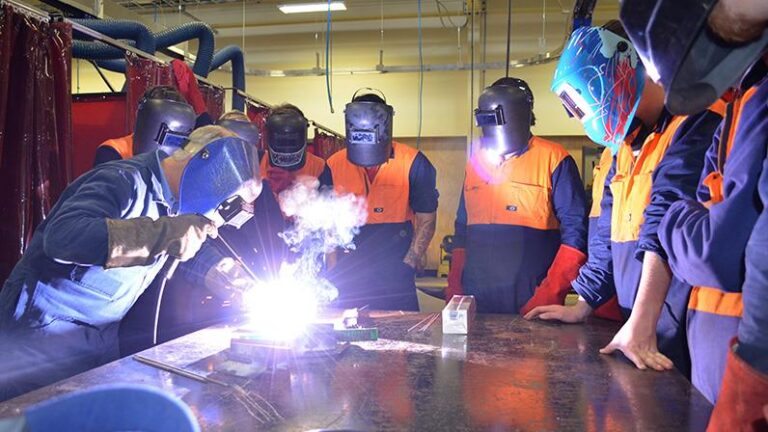Construction Trades Certification: Unlock Career Success in Skilled Trades
Anúncios
Are you looking to boost your career in the **construction trades** industry? Earning a **Construction Trades Certification** might be your key to unlocking new opportunities and achieving success. In this article, we’ll explore the benefits, popular certification programs, and the future of certifications in this vital sector. With demand for skilled workers on the rise, getting certified can set you apart and open doors in a competitive job market.
Why Choose a Construction Trades Certification?
Choosing a Construction Trades Certification offers numerous advantages for those seeking a foothold in the skilled trades industry. Not only does it demonstrate a commitment to professionalism, but it also signals expertise in a chosen field. For many employers, having certified skills is a critical factor in hiring decisions.
Certification provides hands-on training that prepares individuals for real-world challenges. This practical experience gives workers the confidence needed to tackle complex tasks, from electrical installations to carpentry projects. Moreover, it can lead to higher salaries and more job opportunities, as employers often prefer candidates who have been formally trained.
Additionally, a certification can open networking opportunities with other professionals and organizations in the industry. These connections can be invaluable for career advancement and keeping up-to-date with new techniques and technologies. Certifications are also a great way to specialize in a particular trade, such as welding or plumbing, enhancing one’s marketability.
By investing time and effort into obtaining a construction trades certification, workers position themselves at the forefront of the industry, prepared to meet current demands and adapt to future trends. This dedication to skill enhancement ultimately paves the way for a successful and rewarding career.
Top Construction Trades Certification Programs

Finding the right Construction Trades Certification Programs is vital for anyone looking to establish or advance their career in the skilled trades. There are several top programs that stand out for their comprehensive training and industry recognition. The National Center for Construction Education and Research (NCCER) offers certifications across various trades such as welding, carpentry, and plumbing. Their programs are highly regarded and widely accepted, ensuring that certified professionals are well-prepared for the workforce.
The International Association of Plumbing and Mechanical Officials (IAPMO) provides specialized certifications for plumbing and mechanical trades. These certifications are designed to meet the industry’s evolving standards and are recognized internationally, making them an excellent choice for those seeking global opportunities.
For those interested in electrical trades, the Independent Electrical Contractors (IEC) offers a certification program that combines classroom learning with hands-on training. Similarly, the National Electric Code (NEC) is renowned for its rigorous standards and in-depth electrical training, ideal for technicians who want to excel in this field.
The National Roofing Contractors Association (NRCA) provides a well-rounded certification for aspiring roofers, focusing on safety standards and advanced roofing techniques. With these respected programs, individuals can pursue specialized paths and gain the skills needed to excel in the construction trades, preparing them for a robust career.
How to Get Certified in Construction Trades
Getting certified in the construction trades involves several key steps that help ensure you are equipped with the knowledge and skills required by employers. First, candidates need to choose the specific trade specialization they wish to pursue, such as carpentry, plumbing, or electrical work. This decision will guide the educational and training path.
Once a trade is selected, enrolling in a recognized training program is essential. Many vocational schools, community colleges, and online platforms offer courses that cover both theoretical and practical aspects of the trade. These programs often include hands-on projects and internships, providing real-world experience.
After completing the coursework, the next step is to pass necessary certification exams which assess competency in the trade. These exams typically cover safety protocols, industry regulations, and specific technical skills. Study guides and prep courses are available to help candidates prepare effectively.
Another critical component is gaining apprenticeship experience. Many trades require candidates to work under the supervision of a certified professional to hone their skills and meet experience prerequisites. This hands-on training is invaluable in mastering the finer points of the trade.
Upon successful completion of exams and apprenticeship hours, candidates can apply for state or national certification, depending on industry requirements. This official credential demonstrates a worker’s qualifications and is a significant asset in job applications and career progression.
Benefits of Construction Trades Certification

Earning a Construction Trades Certification opens multiple avenues for career advancement and personal growth. One of the most significant benefits is the potential for higher earnings. Certified professionals often command higher salaries compared to their non-certified peers, reflecting their enhanced skills and reliability.
Certification also brings a level of credibility within the industry. Employers are more inclined to hire individuals who have proven their expertise through certification. This credential signals commitment, professionalism, and a deep understanding of the trade.
Moreover, certified individuals enjoy improved job security. As the industry evolves, having certification ensures you are equipped with up-to-date knowledge and skills that businesses seek. This aspect is particularly crucial in industries susceptible to economic fluctuations.
The opportunities for networking expand when holding a certification. Certified individuals often gain access to professional organizations and forums where they can connect with other skilled professionals, leading to potential career opportunities and growth.
Additionally, a certification can provide the chance to specialize in specific areas within a trade, such as advanced welding techniques or sustainable construction methods. This specialization not only enhances job prospects but also contributes to career satisfaction as individuals can pursue their interests.
Common Misconceptions About Construction Trades Certification
A common myth about Construction Trades Certification is that it is only for those just starting out in their careers. In reality, certification is beneficial for professionals at all levels, offering advanced courses and specializations that enhance career development.
Another misconception is that certification is too time-consuming and difficult to achieve. While certification does require dedication, many programs offer flexible schedules and hybrid learning options to accommodate working professionals.
Some believe that hands-on experience is more valuable than a certification. However, certification complements experience by providing formal education and up-to-date training on the latest industry standards and technologies.
There’s also the belief that certification isn’t recognized universally. On the contrary, many certification programs are widely acknowledged across industries and regions, enhancing job opportunities in various locations.
Lastly, some consider that certification is expensive with minimal return on investment. While there are costs involved, the potential for higher earnings and better job security often outweighs the initial investment. Many programs also offer financial aid and scholarship options, making certification more accessible.
Future Trends in Construction Trades Certification

The landscape of Construction Trades Certification is evolving with new technological advancements and educational practices. One trend is the rise of digital learning platforms offering flexible online certification courses. These platforms make it easier for workers to learn at their own pace and accommodate different schedules.
Sustainability is becoming a key focus area as well. Certifications now emphasize green construction techniques and eco-friendly materials, preparing professionals for the growing demand in sustainable building solutions.
Another trend is the incorporation of VR and AR technologies in training programs. These technologies offer immersive experiences, allowing trainees to practice complex tasks in virtual environments, improving skill acquisition and safety awareness.
Collaborative certification programs are emerging, offering joint credentials recognized by multiple organizations, enhancing global mobility for certified professionals. Workers will find it easier to work in diverse locations with these shared standards.
Moreover, there is an increased emphasis on diversity and inclusion within certification programs. This approach ensures that training environments are welcoming to all, and the resulting workforce better represents a diverse society.
The Path Forward in Construction Trades Certification
Embarking on a journey to secure a Construction Trades Certification offers numerous advantages, from enhanced career prospects to specialized knowledge in a chosen field. By addressing common misconceptions, understanding the benefits, and exploring future trends, individuals can make informed decisions about their educational paths.
Certification not only raises the bar for personal success but also sets a high standard for the industry as a whole. As we embrace digital transformation and sustainable practices, staying current with certifications will be key to long-term growth and adaptability within the trades.
With hands-on training and abundant resources, today’s aspiring tradespeople are better equipped than ever to meet the demands of a dynamic work environment. So, whether you’re starting your career or seeking to advance, now is the perfect time to invest in your future with a construction trades certification.
FAQ – Frequently Asked Questions About Construction Trades Certification
What are the benefits of earning a construction trades certification?
Certification enhances career prospects, increases earning potential, provides job security, and ensures up-to-date industry knowledge.
How can I find the right certification program for my trade?
Research recognized programs like NCCER or IAPMO, consider online options, and evaluate course flexibility and curriculum relevance to your specialization.
Are construction trades certifications recognized globally?
Yes, many certifications are recognized internationally, especially joint programs that offer credentials accepted by multiple organizations.
Is hands-on experience necessary for certification?
Yes, most certifications combine theoretical learning with hands-on training or apprenticeships to ensure practical competence in the trade.
Are online certification courses effective in the construction trades?
Online courses offer flexibility and can effectively cover theoretical content, often supplemented by in-person workshops for practical skills.
What future trends should I be aware of in construction trades certification?
Expect more digital and flexible learning options, increased focus on sustainable practices, and the use of VR/AR for immersive training experiences.






